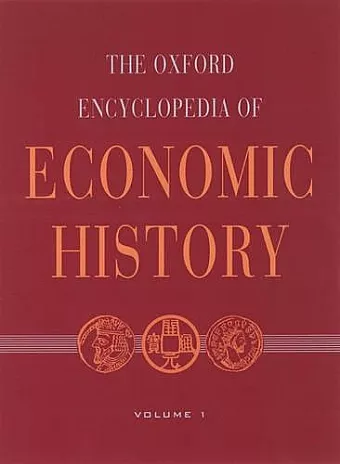The Oxford Encyclopedia of Economic History
5 volumes: print and e-reference editions available
Format:Hardback
Publisher:Oxford University Press
Published:18th Sep '03
Currently unavailable, and unfortunately no date known when it will be back

It is difficult to understand history or the conditions of modern society without a strong grasp of the economic past. Time and again, historic change is wrought by an underlying economic dynamic. For instance, what were the economic roots of modern industrialism? Were resource scarcities a positive element in stimulating technological change through the ages? Why were the Malthusian predictions of overpopulation and starvation in the early nineteenth century confounded? Were labor unions ever effective in raising workers' living standards? Did high levels of taxation in the past normally lead to economic decline? What were the roots of economic imperialism and what effect did it have on today's underdeveloped world? What were the effects of the poor law reforms in Britain in the 1830s? These and similar questions profoundly inform a wide range of intertwined social issues whose complexity, scope, and depth will become fully evident in this encyclopedic treatment of the subject. The encyclopedia contain the following types of articles: - Country and regional essays. Examples: France, Genoa, New England, Ohio River, the Ruhr. These articles may range from relatively exhaustive essays of 10,000 words to 500 words. · Major essays on abstract concepts. Examples: Industrial Revolution, Feudalism, Invention, Malthusian models, Famine, Accumulation. Essays between 5,000 and 8,000 words. · Major essays on institutions, phenomena, and historical processes. Examples: Investment banks, cotton, steel, trading routes, real wages, business cycles, slavery, canals. Essays between 3,000 and 8,000 words. · Shorter essays on abstract concepts. Examples: productivity change, Engel's Law, cartels, gold standard. Essays between 1,000 and 5,000 words. · Shorter essays on concrete facts, institutions, events, and phenomena. Examples: guilds, enclosures, free banking, Great German Inflation, homestead farming, New Deal, I. G. Farben. Essays between 500 and 5,000 words. · Important names from both technology and business, along with economic historians of note. Examples: Richard Arkwright, Johann Gutenberg, Benjamin Franklin, John D. Rockefeller, Hjalmar Schacht, Karl Marx. Essays between 500 and 2,000 words. Because of the interdisciplinary complexity of the field, the encyclopedia is divided not only by chronological and geographic boundaries, but by related subfields such as agricultural history, demographic history, business history, and the history of technology. Smaller categories include financial and corporate history, the history of migration, and transportation history. Each article...
A substantial and comprehensive reference work that will delight and inform both students and researchers alike ... well organized and superbly edited. * American Reference Book Annual *
There is no source comparable to this. * Booklist *
- Winner of ^I Library Journal^R Best Reference 2003 RUSA Outstanding Reference Source 2004 ^I Choice ^R Outstanding Academic Title 2004.
ISBN: 9780195105070
Dimensions: 231mm x 297mm x 198mm
Weight: 8414g
2824 pages